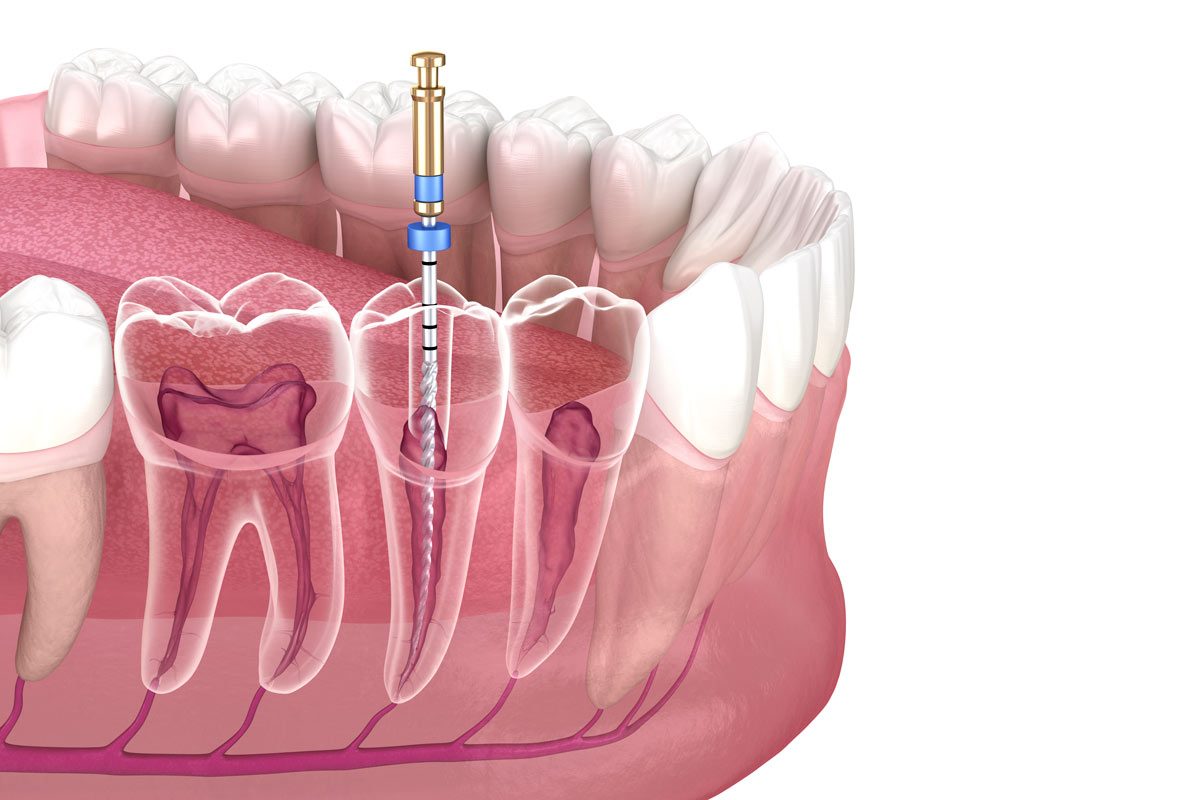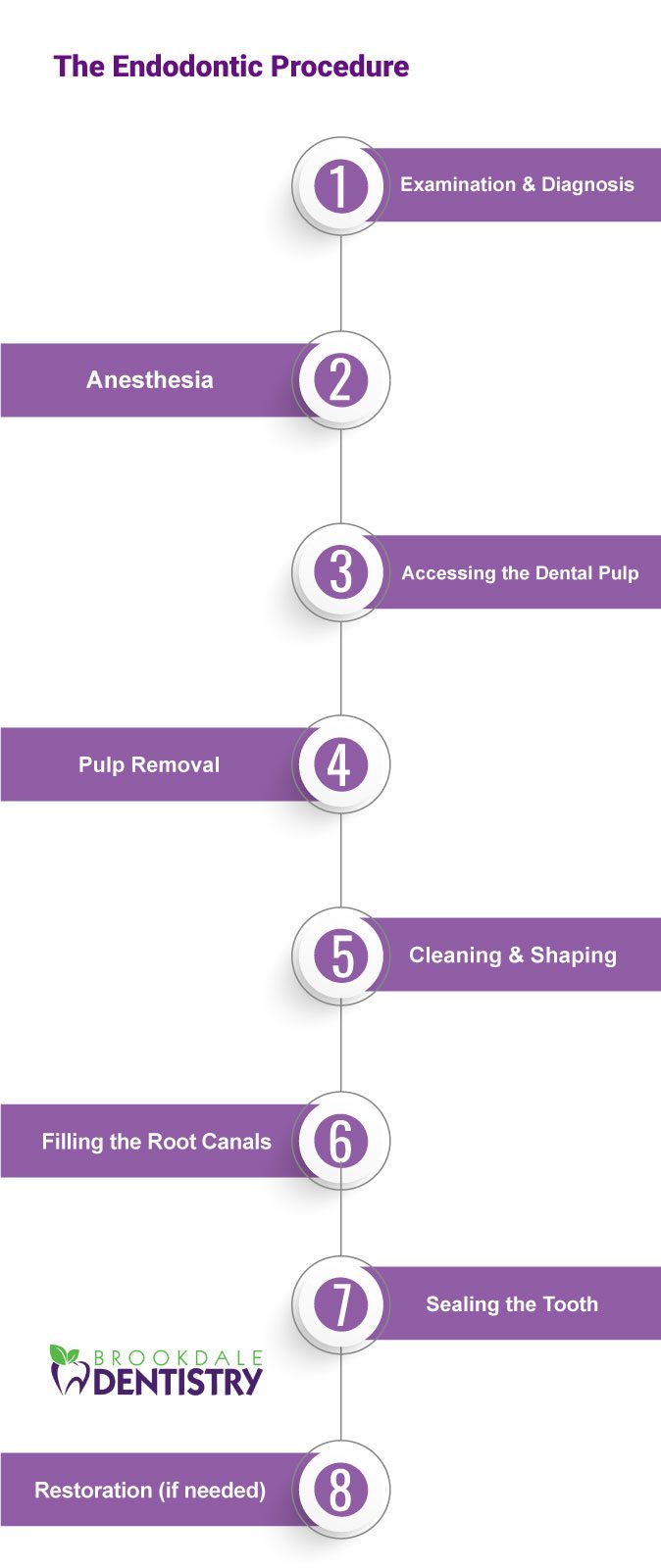Treatment of the tooth’s interior, notably the dental pulp and root canals, is the main focus of endodontics. In order to treat diseased or inflamed dental pulp, clean the root canals, and seal the tooth to stop further infection, root canal therapy is the most popular endodontic operation.
At Brookdale Dentistry in Yonge St, Ontario, we offer excellence in endodontic care, providing effective treatments to save teeth and restore smiles.



Endodontic treatment is the best option for various dental issues, including:
A severe toothache and possible abscess formation can result from dental pulp becoming infected due to deep decay, a broken tooth, or trauma.
Bacteria can infiltrate the root canal system and lead to infection, which can result in discomfort, swelling, and even tooth loss.
Trauma or injuries to the tooth might harm the dental pulp, necessitating endodontic treatment to preserve the tooth.
The necessity for an endodontic assessment may be due to persistent tooth sensitivity to hot or cold temperatures and dental pulp inflammation.
The endodontic procedure at Brookdale Dentistry follows a systematic approach to save and restore the affected tooth:
In order to evaluate the state of the damaged tooth and ascertain the severity of the dental pulp injury, the dentist performs a complete examination that may include X-rays.
To ensure the patient’s comfort throughout the surgery, local anesthetic is given.
A hole is in the tooth to get to the oral pulp and root canals.
Using specialist endodontic instruments, the tooth pulp that has become diseased or damaged is carefully removed from the root canals.
To get rid of any leftover bacteria and debris, the root canals are cleansed, shaped, and disinfected.
In order to seal and stop reinfection, the cleaned root canals are filled with gutta-percha, a biocompatible substance.
The access opening in the tooth is sealed with a filling or a dental crown for further protection and repair after the root canal procedure.
To restore the tooth’s strength, functionality, and appearance in cases of serious tooth damage, a dental crown may be over the treated tooth.

Patients receive post-operative advice to encourage good recovery and maintain dental health after endodontic therapy. Some general guidelines include:
Continue regular brushing and flossing to maintain oral hygiene and prevent further dental issues.
Over-the-counter pain relievers can help with any mild pain after the operation.
For the first few days after treatment, limit your diet to only soft foods and refrain from chewing on the treated tooth until it heals
To make sure the tooth is recovering properly, patients should go to follow-up sessions.
Due to our dental staff’s advanced training and experience in endodontic operations, we can provide patients with a precise and efficient course of treatment.
To provide the best care, we make use of cutting-edge dental technology, including digital imaging and endodontic tools.
We put a high priority on patient comfort and create a calm setting to allay any fear associated with endodontic treatment.
We can give our patients comprehensive care because our office provides a wide range of dental services.

Brookdale Dentistry on Yonge Street in Ontario aims to provide excellent endodontic care. Our skilled dental staff uses modern technology and specialist knowledge to identify and address dental pulp-related problems. For a thorough endodontic evaluation, if you are experiencing tooth pain or sensitivity, get in touch with Brookdale Dentistry. We aim to preserve your natural teeth, improve your dental health, and give you back your smile and confidence when you leave our office.
When the dental pulp inflames or infects as a result of extensive decay, fissures, chips, trauma, or recurrent dental operations on the tooth, a root canal will be necessary. Infections can cause excruciating pain and even tooth loss if left untreated.
Modern root canal procedures are frequently under local anesthetic, which guarantees that patients won’t experience any pain. With the help of over-the-counter painkillers, you can handle some post-operative discomfort.
Antibiotics are able to control infection, but they are unable to get rid of infected dental pulp. To get rid of the affected tissue and keep the tooth, a root canal is necessary.
If a root canal fails to take place when it is necessary, the infection may spread to the nearby tissues and cause bone loss, a dental abscess, and possible tooth loss.
The complexity of the situation determines how long a root canal operation takes. Most patients only need one visit, while some may need two or more to finish the course of treatment.
Yes, a tooth with a root canal procedure can still develop cavities on the tooth’s surfaces. To stop new cavities from emerging, it’s crucial to practice good oral hygiene and schedule frequent dental checkups.
Most of the time, it is preferable to conserve a natural tooth with a root canal since it improves chewing function, protects the bone structure, and keeps the smile’s natural appearance.
The primary alternative to a root canal is tooth extraction. However, tooth extraction should only be an option if there are no other viable options, as preserving natural teeth is always preferable.
Dental insurance policies frequently pay for endodontic therapy, including root canal therapy. Nevertheless, depending on the particular insurance plan, the scope of coverage might change.
Monday: 12 – 8 p.m. (alternating weeks)
Tuesday – Thursday: 10 a.m. – 8 p.m.
Friday: 10 a.m. – 6 p.m.
Saturday: 9 a.m. – 4 p.m.
Sunday: 11 a.m. – 4 p.m. (alternating weeks)
Phone: 416-207-1021
Email: [email protected]
Address: 3280 Yonge St, Toronto, ON M4N 2L6
© 2025 Brookdale Dentistry. All Rights Reserved.